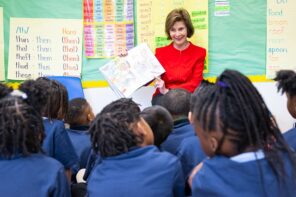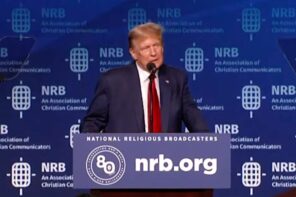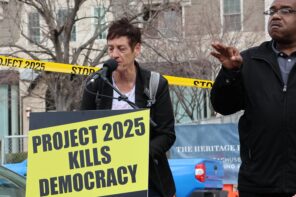There’s been a lot of discussion lately of the Catholic-Evangelical coalition based on new numbers from the Public Religion Research Institute (PRRI) that shows just how misunderstood this “coalition” continues to be.
Vox.com’s anti-gay apologist-in-residence Brandon Ambrosino, whose supposed expertise is “culture and religion,” seems surprised to find that Catholics and Evangelicals “might be less politically aligned than is otherwise thought,” with Catholics more closely “aligned with liberal values than Evangelicals.”

But these numbers shouldn’t come as a surprise to anyone who has bothered to looked at Catholic opinion polling for the past 30 years. The fact is, on most hot-button, sex-related issues, Catholic opinion has long been about the same as public opinion, and mainstream Protestant opinion, as a whole and significantly more liberal than Evangelical opinion.
The turning point for Catholic opinion catching up and in some cases surpassing Protestant opinion in terms of “liberalness” was the early 1980s. For instance, throughout the 1970s, Catholic support for abortion rights was “slightly lower than Protestant,” according to Tom Smith of the National Opinion Research Center, by about seven percentage points. However, “in 1982, for the first time, support for abortions for social reasons, such as poverty, not wanting to get married or not wanting more children, was as high among Catholics as among Protestants.”
The tendency for Catholics to mirror general public opinion on abortion has held over time. A 2007 Pew Poll found that 51% of Catholics think about should be legal in all or most cases, which is “nearly identical to the views of the public as a whole.” A 2009 Gallup Poll found “almost no difference between rank-and-file American Catholics and American non-Catholics” in terms of the moral acceptability of abortion, with 40% of Catholics saying it was morally acceptable versus 41% of all Americans.”
A 2013 Pew Poll found that just over half (53%) of white Catholics said that having an abortion was morally wrong, which was slightly higher than general opinion (49%), while three-quarters of white Evangelicals said it was wrong.
Similarly, Smith found that by the early 1980s Catholics were “more liberal than Protestants on approving of premarital sex and of sex education.”
On the newer issue of same-sex marriage, Catholic opinion has tended to be slightly more favorable than the population as a whole and way more favorable than Evangelical opinion. The 2007 Pew Poll found that 42% of Catholics expressed support for same-sex marriage versus 36% of the population as a whole. In terms of trends, 40% of Catholics supported same-sex marriage in 2001 with that number increasing to nearly 60% by 2014. By contrast, only 13% of Evangelicals favored same-sex marriage in 2001 and just 23% approve of it today.
Writing in The Atlantic, PRRI’s Robert Jones gets at the truth behind these numbers: “there is more support for official Roman Catholic Church positions among white evangelical Protestants than among Catholics.” But, as he notes, this isn’t a new trend; it’s the result of a two-decade long effort to cultivate “a new evangelical flock to compensate for the loss of lay Catholic support on cultural issues like abortion and same-sex marriage.”
The real Catholic-Evangelical convergence is between the Republican leadership, the Catholic bishops, right-wing Catholics, and rank-and-file Evangelicals, a coalition that was cemented by Karl Rove with his aggressive outreach to “conservative” Catholics during the Bush administration. But the fact that a big chunk of moderate and progressive Catholics are missing from this coalition continues to be lost on many in the media. It’s as if as long as the bishops are vocal in their objections to progressive polices and someone in the public is making noise, there’s a tendency to attribute it to “Catholics.” How else to explain the PPRI number that only 37% of Catholics oppose the contraception mandate in the Affordable Care Act, when the widespread perception that Catholics were broadly disapproving of it helped gin up early and critical opposition?
But it’s the bishops and Evangelicals—at nearly 60% opposed—who are the hardcore opposition to the mandate and who fostered outrage over the supposed violation of religious freedom that has gone all the way to the Supreme Court. It’s a case where the numbers matter, but many people don’t seem to pay all that much attention to them.




